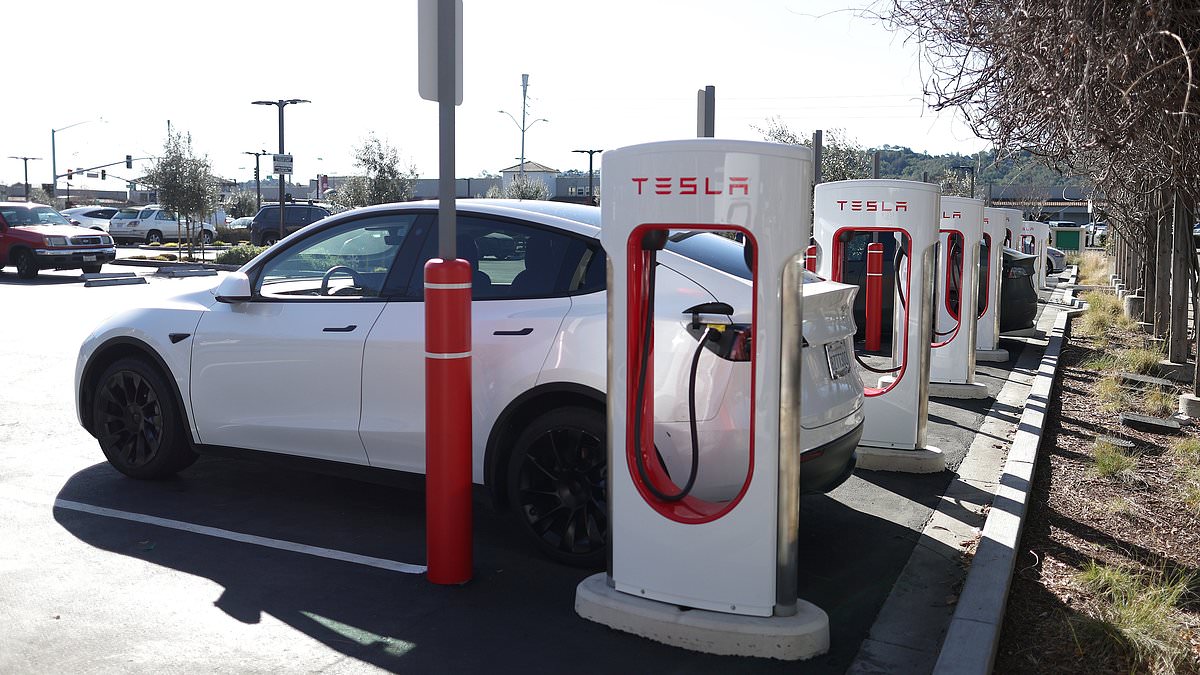Millions of Californians say their state is switching to renewable energy sources too quickly, and experts say that its strict and costly new rules on electric cars will price more people out of the Golden State.
Polling from the University of California, Berkeley, has revealed that, while Californians broadly support more wind and solar farms, nearly a third of residents say the switch to green power is taking place ‘too fast.’
Meanwhile, Stanford University experts warn that looming new rules requiring Californians to spend tens of thousands of extra dollars on costly electric vehicles will drive ever more from the state.
California recorded a net loss of 341,866 residents last year, many moving across state lines to Arizona and Texas, which have lower taxes, cheaper homes and looser environmental rules.
Californians are split on the state’s speedy moves against reliance on fossil fuels
‘As the Golden State’s exorbitant cost of living and strict environmental mandates grow, Californians are hitting the road,’ researchers from the school’s Institute for Economic Policy Research, posted online.
Stanford’s Bruce Cain says California is moving too fast
California is at the vanguard of cutting out fossil fuels, which release planet-heating gasses when burned, producing more than a third of its power from renewables, according to the US Energy Information Administration.
In recent weeks, officials have greenlighted a study into wave and tidal energy potential off the state’s 840-mile coastline, and required more than 5,300 companies to report more details about their carbon dioxide emissions.
Gov Gavin Newsom, a Democrat understood to have ambitions to become US president, also signed a bill to study and plan for solar farms running in the vacant lots alongside the more than 15,000 miles of state highways.
The state has also asked the Biden administration to approve a plan to require all new vehicles sold in the state by 2035 to be either electric or plug-in electric hybrids, speeding the end of gasoline-powered vehicles.
California’s Democratic Gov Gavin Newsom has long championed renewable energy and electric cars
A poll by Berkley’s Institute of Governmental Studies shows that voters broadly support this switch to the growing number of wind turbines and solar arrays that can be seen across the state.
But that still leaves 29 percent of voters saying the switch from hydrocarbons is happening ‘too fast.’
This is especially true among Republican voters. More than two thirds — 67 percent — say they want the administration of Democratic Gov Gavin Newsom to slow down the move away from fossil fuels.
‘The state’s voters largely back its climate change initiatives, although the partisan differences evident in many other policy areas are also present.’ said the institute’s co-director Eric Schickler.
Older Californians, as well as those living in the Central Valley, the North Coast and the Sierra Nevada mountain range, are more likely than others to use oil, coal, and other carbon fuels for longer, the poll showed.
A Tesla Supercharger station in San Francisco, California. Nice, if you can afford it
A common site in California nowadays: A solar farm, near Lancaster
Stanford scholars Bruce Cain and Preeti Hehmeyer in their new research warn that California’s speedy switch to renewables could be denting the appeal of a state that has in recent years been waving goodbye to residents.
The state’s population grew massively throughout the 20th Century, but peaked in about 2019-2020 and has been slowly declining since, thanks to fewer births and more residents moving out, often for cheaper living in Texas and Arizona.
In their paper, California’s population drain, Cain and Hehmeyer argue that tight environmental rules and the additional costs they place on consumers make one more reason for residents to leave.
Californians already pay over the odds for housing, they say. Making them shell out an average of $640,000 on an EV truck, when the diesel-powered equivalent is just $160,000, could be the last straw for a cash-strapped resident.
‘There is reason to be hopeful that these prices will ultimately come down and that charging infrastructure will eventually catch up, but the intervening years could be rough, and with more population and commercial outflows,’ the eight-page report.
California voters were keener on EV subsidies than those in Texas or Arizona
In their survey of more than 3,000 people across Arizona, California and Texas, they found that nearly of voters supported state subsidies for electric cars, another third was opposed.
Californians were significantly keener on EVs than residents of the other states.
The research was released at the same time as new US Census Bureau data revealed that California and New York combined lost nearly 1.4 million residents last year.
Overall, California recorded a net loss of 341,866 people, compared to 244,137 for New York.
Population experts have long studied America’s people flows.
Some explanations for interstate migration patterns are widely accepted.
Americans mostly relocate for better jobs, affordable housing, cheaper living costs, and to lower their tax bills.
America on the move: Texas, Florida, Georgia, and Arizona all counted more arrivals than departures
Some move away from high crimes areas, homelessness, and the sight of drug addicts stumbling on the sidewalk.
Social problems have been a headache for officials in such cities as San Francisco and Portland.
Still, William Frey, a demographer at The Brookings Institution, a think tank, said Americans mostly hit the road for money.
‘Interstate movers are motivated by employment, housing, and family reasons,’ Frey told .com.
The top relocation trends of recent years have seen New Yorkers flock to Florida and Californians choose Texas, he noted.
